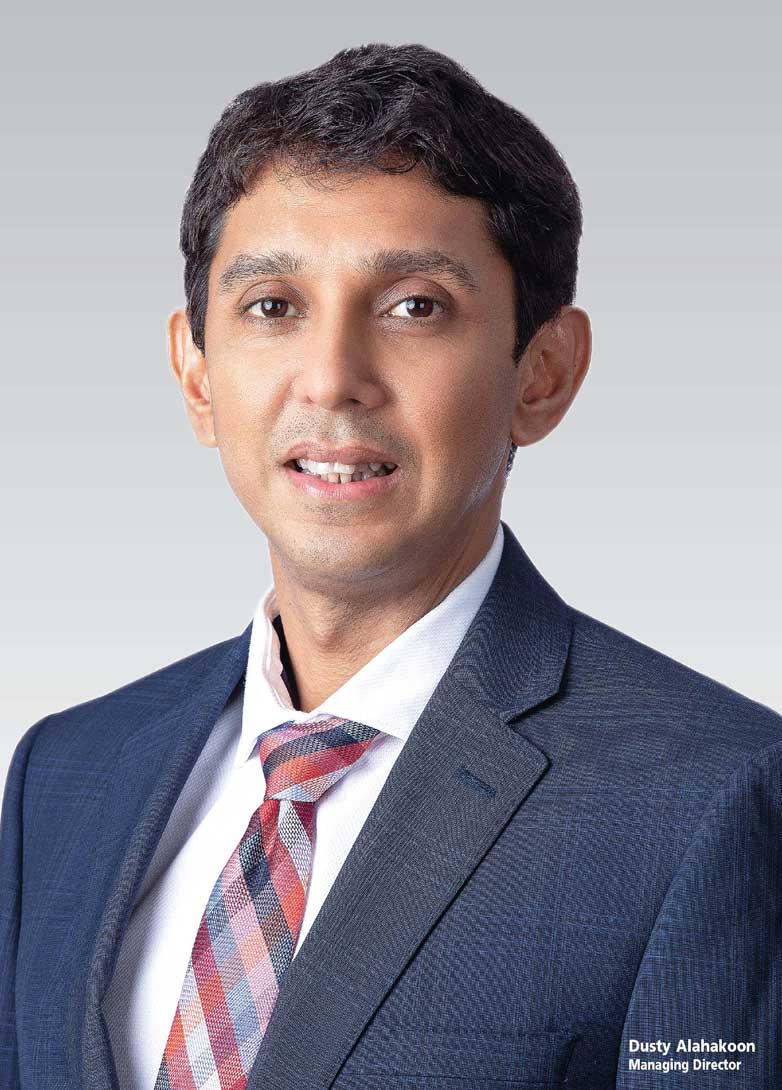HEINEKEN LANKA
Q: Given your more than 20 years of experience in different MNCs, what similarities and differences have you observed between them?
A: My experience with multinationals began in 2000 when I joined Ceylon Tobacco Company (CTC). I was with the company for six years and ended up heading its brand marketing.
From CTC, I moved on to Coca-Cola Beverages Sri Lanka as the Head of Marketing. The company was at a pivotal point in its journey, and this is where I discovered my passion and drive to create tangible change.
Thereafter, I moved to Heineken Lanka – formerly known as Asia Pacific Brewery – and this was where the real transformative shift of an organisation began. This has been my biggest challenge and the most rewarding of experiences so far.
 Over the past decade, Heineken Lanka transformed itself from being a small local entity to a true multinational organisation that is known for its youthful, vibrant and global outlook – home to some powerful and meaningful brands, and people that personify the enjoyment of life.
Over the past decade, Heineken Lanka transformed itself from being a small local entity to a true multinational organisation that is known for its youthful, vibrant and global outlook – home to some powerful and meaningful brands, and people that personify the enjoyment of life.
The common element across all these multinationals is the unmatched exposure and personal development gained. I developed as a leader with the global exposure and opportunities I enjoyed at these companies. Each company has a unique culture that’s connected to their roots and the type of sector it is in.
Q: How has the organisation stayed abreast of the changing environment?
A: Heineken is over 150 years old. It has survived many obstacles over this time, and the main success factor has been its ability to adapt, change and innovate ahead of the curve. Taking into account recent years and the current pandemic, we recently embarked on a new strategic journey called EverGreen.
EverGreen was inspired by nature’s resilience, and its ability to adapt and renew itself. This is something that we as a company can learn from as we rise to meet the ever-changing demands of the world by focussing on the programme’s five pillars – viz. growth, cost and value, sustainability and responsibility, digital technology, and people and culture.
Q: How has Heineken adopted sustainability as a corporate practice?
A: We’ve laid a solid foundation with our sustainability strategy, which we call ‘Brewing a Better World’ (BaBW). We show people how enjoying life and creating human connections can go hand in hand with addressing the major challenges of our time, and make a positive contribution to the environment and social sustainability, and through responsible consumption
This idea is now intrinsic across our value chain. We made significant improvements to our brewery in Mawathagama, which has made it a cutting-edge facility in Sri Lanka with a carbon footprint that has reduced by 31 percent since 2018.
Our water consumption has reduced by 22 percent since 2018 as well.
Over the years, we’ve introduced meaningful brands that resonate with local consumers, advocating for responsible consumption and the enjoyment of life. This is because we cannot expect the government to fight this battle alone, and need to partner for collective action and scalable impact.
Q: What major challenges have MNCs in Sri Lanka faced in the recent past?
A: I feel that local MNCs are true advocates of ‘Brand Sri Lanka’ when it comes to promoting foreign direct investment (FDI) inflows. Therefore, creating investment friendly policies is important.
With regard to this aspect in particular, I want to highlight the need to create a fair playing field in industries so that more MNCs will have the confidence to invest in Sri Lanka.
As an organisation that has been in the country for 22 years, we’re here for the long run. With favourable, fair and equitable operating conditions, we will also invest more in Sri Lanka, and bring in much needed FDI, technology and global expertise.
Policy stability and consistency are very important for future investments. If we look at the last decade, this has been the biggest issue.
Typically, MNCs take a long-term view and invest for the next 20-30 years. In the absence of policy consistency, investments are easily diverted to other countries while they adopt a ‘wait and see’ or ‘minimum investment’ policy for inconsistent markets.
Q: In your opinion, what is the way forward for the sector – and what are the potential growth areas?
A: In Sri Lanka, the biggest issue with beer is consumer choice and the non-availability of brands across all outlets due to unfair play. As we have seen in other markets, there is a trend favouring global brands and our consumers deserve fair access to them.
We also see consumer affinity shifting towards low alcohol options in the pursuit of moderation and responsible consumption. There is also a shift towards lighter, low calorie, flavoured and natural options as well.
Q: Where do you see Sri Lanka heading in the mid to long term?
A: If we play our cards right, we could certainly be the ‘hub’ between Dubai and Singapore that many speak of frequently. We’re also closer to a nation with a population in excess of one billion, which has a substantial middle class and spending power.
We can certainly be the equivalent of Hong Kong to China in this relationship if we position ourselves appropriately with this opportunity. We need to carefully select our strengths and the playing field as we cannot be good at everything.
Overall, I believe that we are on the path to recovery and emerging stronger from the pandemic.
– Compiled by Ashwini Vethakan
INTERVIEWEE DETAILS
Dusty Alahakoon
Managing Director
CONTACT DETAILS
Telephone:4866575
Website:www.heinekenlanka.com




